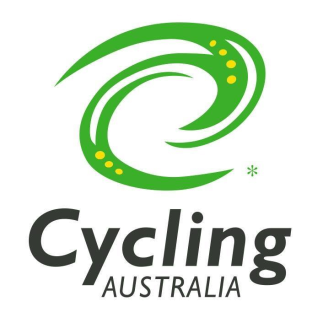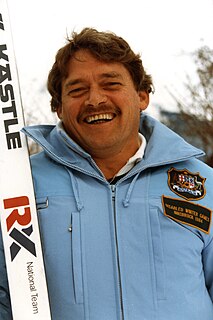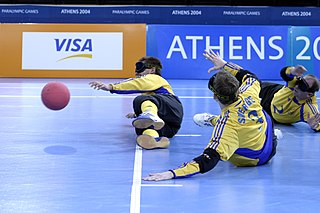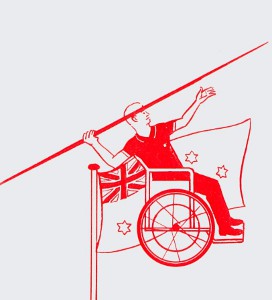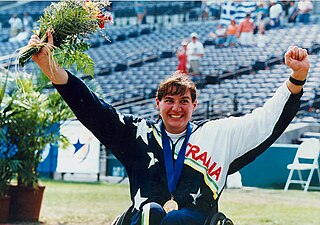
Alix Louise Sauvage, OAM is an Australian paralympic wheelchair racer and leading coach.

Australia has competed in every Winter Paralympics. In 1976, the first Games, Australia's sole competitor was Ron Finneran, but he was not an official entrant. In 1980, Kyrra Grunnsund and Peter Rickards became the first official competitors, in alpine and cross-country skiing. The number of Australian athletes increased to three, five, five and six at the next four games, respectively, and all of the athletes were alpine skiers. The participation decreased to four in 1998 and climbed back up to six in 2002. Australia won its first Winter Paralympic medals in 1992, and has medalled at every games since then. All of the medals have been won in alpine skiing.

Australia sent a delegation to compete at the 2008 Summer Paralympics in Beijing. The country sent 167 athletes in 13 sports and 122 officials. It was the country's largest ever Paralympic delegation to an away Games. The team sent to Beijing was described as the emergence of the new generation of Australian athletes with 56 percent of the team attending their first Paralympic Games. The delegation's chef de mission was Darren Peters.

At the 2010 Winter Paralympics in Vancouver, British Columbia, Canada Australia sent ever of 11 competitors to compete against 42 other nations with a total of 502 competitors making these Paralympics the largest ever with only 39 countries competing at Torino in 2006. Of these other nations, 2010 was the first winter paralympics for Argentina, Bosnia & Herzegovina, Romania, Russian Federation, and Serbia. The delegation also consisted of 3 sighted guides and 17 support staff. This was the largest delegation Australia had sent to a Winter Paralympics. Australia has participated in every winter Paralympics. In 2010, Dominic Monypenny became the fourth Australian athlete to participate in both the Summer and Winter Paralympic Games, the others being Kyrra Grunnsund, Anthony Bonaccurso, and Michael Milton. In the lead-up to the 2010 winter Games, nine of the 11 Australian athletes had recorded top 10 finishes in Paralympic, world cup or world championship competition in their class.

The 1984 Winter Paralympics, then known as The Third World Winter Games for the Disabled, were held in Innsbruck, Austria. The games took place from the 15 until 21 January. Present at these games were 419 athletes from 21 countries, Spain and the Netherlands competing for the first time in the Winter Paralympics, competing in 107 events across 3 sports. The inclusion of Les Austres and Cerebral palsy impairment groups contributing to the distinct increase in athlete participation with the total number of athletes jumping from 229 at Geilo, Norway in 1980.

Australia competed at the 2012 Summer Paralympics Games in London, United Kingdom from 29 August to 9 September 2012. The London Games were the biggest Games with 164 nations participating, 19 more than in the 2008 Beijing Paralympic. Australia has participated at every Summer Paralympic Games and hosted the 2000 Sydney Games. As such, the 2000 Sydney Games, regarded as one of the more successful Games, became a point-of-reference and an inspiration in the development of the 2012 London Games.

The 1998 Winter Paralympics were held in Nagano, Japan from the 5–14 March 1998. At the Games, Australia was represented by four male alpine skiers. Australia finished equal 16th of 21 Nations on the overall medal tally. James Patterson, an LW9 standing skier, won Australia's two medals - one gold and one bronze.
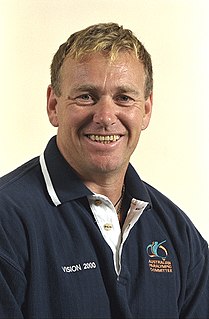
John Desmond Eden is a leg-amputee athlete and Australian and New Zealand Paralympian.

Hamish Anderson MacDonald, OAM is an Australian Paralympic athlete. He was born in Melbourne and lives in Canberra. He has cerebral palsy. His achievements and advocacy have made him one of Australia's most respected Paralympians.

Christopher John Nunn, OAM is an Australian athletics coach. He was the head coach of the Australian athletics team at the 2000 Sydney Paralympics.

Gregory Neil "Greg" Hartung AO is a leading Australian and international sport administrator. He has an extensive and distinguished career in sport particularly in terms of administration and journalism. He was President of the Australian Paralympic Committee from 1997–2013 and served as Vice-President of the International Paralympic Committee 2009–13.

Australia was represented by one non-competing athlete at the inaugural 1976 Winter Paralympics. The games were held in Örnsköldsvik, Sweden over seven days from 21 to 28 February 1976.

Jason Scott Hellwig is a leading Australian sport administrator. He was the Chief Executive Officer of the Australian Paralympic Committee from 2010 to 2015.

Anton James Flavel, OAM is an Australian athlete with an intellectual disability. He was born in the Western Australian town of Narrogin. In his disability class he held a world record for the javelin and an Australian record in the shot put and high jump.

Mitchell Gourley is an Australian Paralympic alpine skier who competed for Australia in the downhill, super-G, giant slalom, slalom and super combined events at the 2010 Winter Paralympics in Vancouver and 2014 Winter Paralympics in Sochi, but did not win a medal. At the 2017 IPC Alpine Skiing World Championships in Tarvisio, Italy he won the gold medal in the Men's Super Combined Standing. He was Australian team co-captain at the 2018 Winter Paralympics.
Disabled Wintersport Australia (DWA) was established in 1978 as the Australian Disabled Skiers Federation. Its current mission is “to promote and foster the advancement of participation by people with a disability in wintersport both in Australia and overseas”. DWA is a member of the Australian Paralympic Committee. DWA plays a major role in the development of Australian athletes that compete at the Winter Paralympics.

Australia sent a team of 12 athletes and three guides to the 2018 Winter Paralympics in PyeongChang, Korea. Australia finished 15th on the medal table and it was its fourth best medal performance at the Winter Paralympics.







